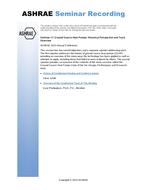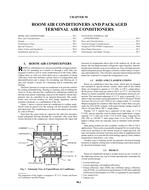The most common problem affecting residential and light commercial heating, ventilating, and air-conditioning (HVAC) systems is slow refrigerant leaks. Equipment users are usually not aware of a problem until most of the refrigerant has escaped. The concept of a nonintrusive refrigerant charge indicator was developed. The sensor, based on temperature measurements, appears to be inexpensive and easy to incorporate into existing heat pumps and air conditioners.
The design of the refrigerant charge indicator is based on the fact that when refrigerant starts to leak, the evaporator coil temperature starts to drop and the level of liquid subcooling drops. When the coil temperature or liquid subcooling drops below a preset reading, a signal can be activated to warn the equipment user that the system is undercharged. A further drop of coil temperature or liquid subcooling below another preset reading would trigger a second warning signal, such as a red warning light, to warn the equipment user that the unit now detects a leak and immediate action should be taken. The warning light cannot be turned off until it is re-set by a refrigeration repairman.
Temperature sensors are becoming very accurate and low in cost compared with pressure sensors. Using temperature sensors to detect refrigerant charge status is inherently nonintrusive, inexpensive, and accurate.
This paper provides laboratory test data on the change of indoor coil refrigerant temperature and subcooling as a function of refrigerant charge for a 2-ton off-the-shelf air conditioner and a 2-ton split heat pump system. The data can be used in designing the indicators for refrigerant loss.
Units: I-P
Citation: ASHRAE Transactions, vol. 111, pt. 1, Orlando 2005
Product Details
- Published:
- 2005
- Number of Pages:
- 6
- File Size:
- 1 file , 4.8 MB
- Product Code(s):
- D-25684


